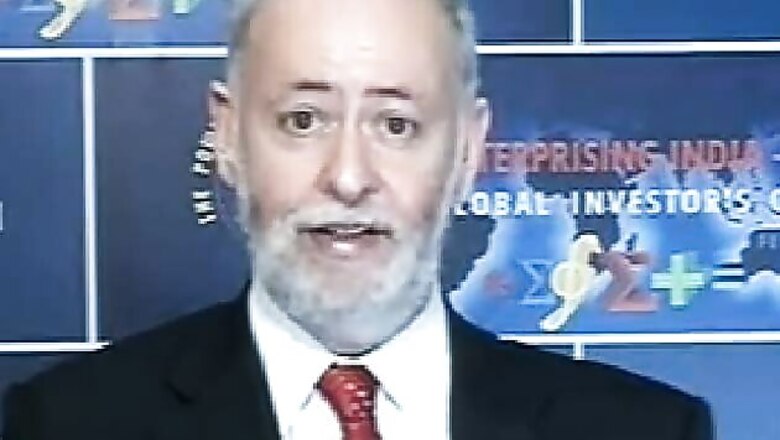
views
Jim Walker of Asianomics warns against holding high hopes from the government this Budget season. In an interview to CNBC-TV18, he says that expecting miracles or a big bang Budget could be a dangerous thing. However, he is hopeful that the government will deliver on its promises of the last four-six months. "We hope that we will actually hear about plans to bring down government expenditure, reducing the subsidy element in the expenditure side of the Budget and on how it is going to, on medium-term basis, improve the fiscal position," he said.
He also hopes that the Finance Ministry will provide investment opportunities to the private sector, so as to give a jump start to the investment cycle in the country. "The global economic slowdown is likely to continue in 2013, but the fundamentals of Indian companies will continue to remain strong," he said. However, unless the government does something to start the train rolling as regards to infrastructure spending and private participation, Walker says that economic growth in India through 2014 will be weaker than in FY13.
He further adds that the government should effectively use the tools at its disposal, as scope of further easing by the Reserve Bank of India over the coming year will be dependent on the steps taken in the Budget.
Below is the edited transcript of the interview on CNBC-TV18
Q: Do you think it is going to be a big bang Budget or are you not expecting a miracle from the Finance Minister?
A: I think expecting a miracle would be a dangerous thing to do. However, we are hopeful of course that the government will start delivering on some of the promises it has been making for the last four-six months and that we will actually hear about plans to bring down government expenditure. Reducing the subsidy element in the expenditure side of the Budget would also be a good positive move. We also hope to hear how it is going to, on medium-term basis, improve the fiscal position. We are heading to hopefully 4 per cent of gross domestic product (GDP) rather than 5-5.5 per cent.
Q: What to your mind will be the more important part of the speech, what he has to say about curbing expenditure on the fiscal deficit or what he has to say about encouraging infrastructure? Criticism at this point is that he may put out a fiscal deficit target but growth itself has been quite paltry, so you do not want to see him cutting expenditure on that side.
A: I am in two minds about growth that is being driven by government spending. That always strikes me as being relatively low quality growth and quite often unsustainable. I would like to see a plan being announced which drives growth into the private sector, which will make it easier for companies to acquire land, for infrastructure spending to be shared with private sector and for the private sector to take the lead as much as possible. That would be the right way to go and that would probably result in much more sustainable economic growth.
The thing is that governments around the world seem to think that the growth that they generate is every bit as good as the growth that the private sector generates. I am afraid that is very rarely the case. Their growth always comes from taking the money away from somebody else whereas the private sector growth comes from generating new ideas and new profits on its own and being given opportunities to make money. That is why I want to see the government delivering opportunities to the private sector.
Q: We have come out of a pretty poor earning season where we saw volume growth grinding down over the last three months and consumption growth beginning to falter. Are you getting worried about the basic growth premise for India?
A: Our view was that economic growth in India was going to be in the range of 4-6 per cent for fiscal year 2013. That is pretty well in the consensus now; in fact the government's Central Statistical Organisation (CSO) is at 5 per cent, which is the middle of that range.
I suppose the big difference now is that we do not see any grounds for revival in growth. As you mentioned, the corporate earnings season is the driver for us, that we have been focused on fundamentals in Indian companies that are good. Over the course of the last year or so the cash flow position, the debt to cash flow position and corporate earnings have started to weaken, which is inevitable when growth does slowdown.
So what we expect to happen now and in the next phase of the cycle is that capital expenditure will be cut in the private sector unless the government does something to start the train rolling as regards to infrastructure spending and private participation in that. If it doesn't, then we expect capital expenditure to be cut in the private sector and if anything economic growth in India through 2014 will be weaker than in FY13.
Q: Given your understanding of what is affecting growth at this point, do you think the Finance Minister has the tools at hand to affect a dramatic turnaround?
A: It has got tools at hand, but the government rarely uses those tools. The tools it would have at hand would be to cut the cost of the business sector, to reduce regulation, to make it easier to acquire land, to produce infrastructure that would be supportive of a private sector revival, which includes investment in the power side and transport linkages. So there is plenty the government can do.
But as far as what the government is likely to do, there is going to be very little action to shore up private sector profitability and then let that private sector profitability take the lead in the economic growth by cutting cost, cutting tax and cutting regulation. That would be incredibly supportive of economic growth in India over the next two years, but I am not holding my breath for that to happen.
Q: What is the global backdrop looking like now? We had a few benign months where people were complacent and volatility was low. It is only in the last fortnight that we have started to see small red flags popping up in Europe, China and even in the US. Do you expect more turbulence and volatility over the next three months compared to the preceding six?
A: Complacency had really set in at the end of last year, based on central banks just printing more and more money. Look at the Japanese market over the course of the last few months; that has soared on the back of promises to just print money and create inflation. That of course means that companies in Japan are dependent on a very weak yen. So what we have got now is a bet on the currency in Japan rather than on fundamentals.
When we come down to fundamentals globally, then I am afraid we do not see the support for the market euphoria and market complacency that we saw at the beginning of FY13. The backdrop is that we have a very modest growth in the US, but at least we have growth, and we have a growing recession in Europe and that is a terrible backdrop for exporting countries.
In China, I think there are significant question marks on the whether or not Chinese policy is going to start reversing now, because what they have done over the course of the last few months is prop up the property bubble yet again, push it backup with new money and also increase the infrastructure spending at local government's level who have done very little to renew private sector with the cost concerns. So I think that the way the people have been viewing global growth has been very complacent and not supported by the fact that this is a very slow growing global economy. We can see it in corporate earnings results and places like India and elsewhere. So I do not think that is going to change in 2013.
Q: Growth seems quite paltry, infrastructure and manufacturing are not pushing the way they should, inflation is still quite volatile and the global scenario as well is uncertain. So how would that set out the pace for the Reserve Bank governor for the rest of this year?
A: It is a difficult quandary for the governor to be in, isn't it? There are a lot of factors, which suggests that he should be easing policy and cutting interest rates, and I am certain he would like to be doing that. But there are also factors like inflation and more particularly the fiscal deficit that will probably going to make him stay his hands.
Unless the Budget produces a very concrete programme to contain government spending and start getting on a track to review fiscal consolidation, I think we are going to be disappointed by the scope that the RBI has for monetary ease. If the government delivers, and let us keep our fingers crossed, then I think we could be in for quite a good period of interest rate cuts in India because the global backdrop and the corporate backdrop would support that significant monetary easing at the moment.
















Comments
0 comment